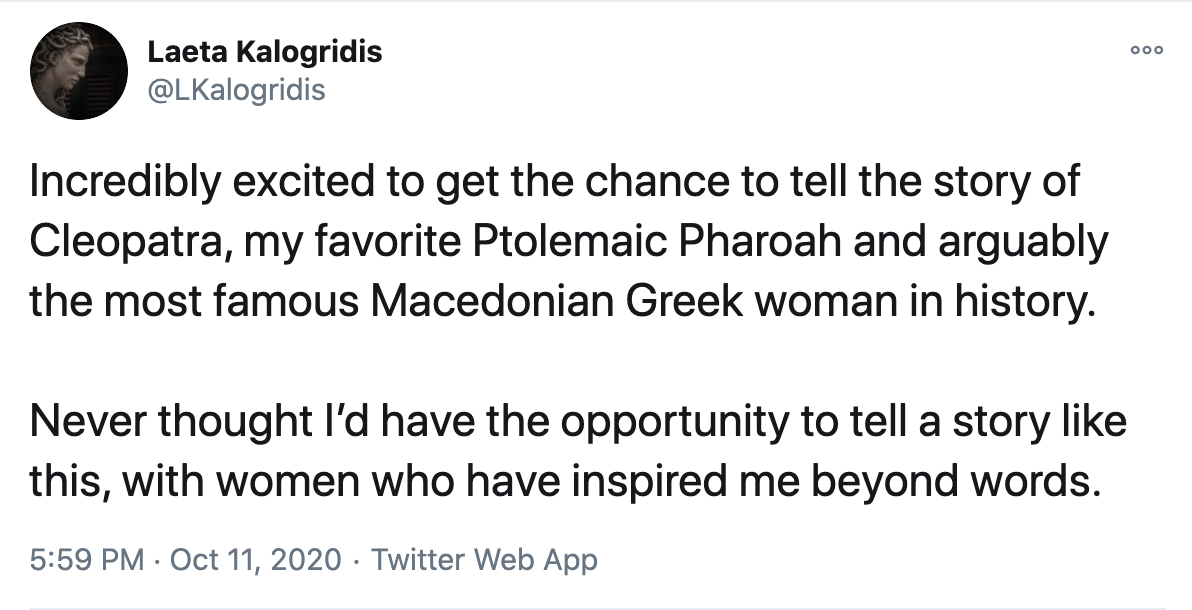SCS Diablog: Forever in Bloom: Kehinde Wiley’s Archaeology of Silence
By Richard Armstrong | May 8, 2024
Blog: Bad Boys and Worse Verse: Hades and Persephone in Translation, from Ovid’s Metamorphoses to Young/New Adult Fiction
By ToriLee | September 26, 2023
Odysseus Shot First: Signs of Differing Traditions in Odyssey 16-22
By ToriLee | July 5, 2023
Blog: Ancient Worlds, Modern Communities: Contemporary Responses to Greek Myth and Tragedy through Drama, Film, and Visual Art
By Nina Papathanasopoulou | August 23, 2022
The Ancient Worlds, Modern Communities initiative (AnWoMoCo), launched by the SCS in 2019 as the Classics Everywhere initiative, supports projects that seek to engage broader publics — individuals, groups, and communities — in critical discussion of and creative expression related to the ancient Mediterranean, the global reception of Greek and Roman culture, and the history of teaching and scholarship in the field of classical studies. As part of this initiative, the SCS has funded 132 projects, ranging from school programming to reading groups, prison programs, public talks, digital projects, and collaborations with artists in theater, opera, music, dance, and the visual arts.
Blog: The Luis Alfaro Residency Project
By Young Kim | May 27, 2022
I first met Luis Alfaro at the 2019 annual meeting of the Society for Classical Studies, where he delivered a deeply moving keynote address in which he discussed his adaptations of Greek tragedies and how his plays have brought reimagined ancient stories to new audiences, to provoke social change. This profoundly important event was made possible by a partnership with my former employer, the Onassis Foundation USA, the Classics and Social Justice affiliated group, and the SCS.
Blog: Dissertation spotlight: A Tale of Four Cities: Exploring Classical Reception in Modern Hebrew
By Giacomo Loi | October 22, 2021
As I strolled one day in the old center of Tel Aviv, I entered the house of Haim Nachman Bialik, the Hebrew national poet. An imposing building, it constitutes a manifesto of Jewish art in the early 20th century: the architectural style reprises oriental shapes, alternating arches and square forms; the decoration aims to express a quintessentially Jewish art. As I daydreamed about the poet holding private meetings and public receptions with the foremost representatives of culture and politics of his day, my eye was caught by two decorative tiles. These tiles, located at opposite ends of an arch that leads into the salon, represent two opposite moments of Jewish history: on one hand, a tile reproduces the Judaea capta coin minted by Vespasian after the First Jewish War; on the other, another tile mirrors Vespasian’s coin, proclaiming, in Hebrew letters, “Judaea liberated.”
Blog: An interview with the AAACC, Recipient of the WCC 2020-2021 Professional Equity Award
By Suzanne_Lye | February 10, 2021
The Women’s Classical Caucus (WCC) invites you to celebrate the winners of its 2020–2021 Public Scholarship and Advocacy awards and to learn more about how their work is influencing our field. Over the next month, the SCS Blog will publish a three-part series of in-depth interviews by the WCC with the award winners, who discuss their work in strengthening communities within the field and introducing new audiences to Classics.
Blog: Between Charybdis and Scylla: Greeks and Romans in Panama After 1903
By Catherine Muñoz Arango | November 16, 2020
On November 3, 1903, the Department of the Isthmus separated from the Republic of Colombia and became its own republic. This act ended 82 years of history between them. The reason? to allow the US to build a canal after Colombia refused to in August of that same year.
Blog: Tracing Tragedy: Classical Reception in Modernist Literature
By Manya Lempert | November 9, 2020
Some months ago, a piece by Leah Mitchell and Eli Rubies on Classics and reception studies in the 21st century reiterated the importance of studying the reception of classical antiquity. It was a reminder that reception of classical material itself predates the scholarly field devoted to it.
Blog: Part I: Casting Cleopatra: It’s All About Politics
By Three Ancient Historians | November 2, 2020
On October 11 2020, American screenwriter and producer of Greek descent Laeta Kalogridis posted this tweet:

